(For this study you will have to provide drawings, or a PowerPoint presentation: Download HERE)
Let’s read Genesis 1:11-13
11 Then God said, ‘Let the land produce vegetation: seed-bearing plants and trees on the land that bear fruit with seed in it, according to their various kinds.’ And it was so. 12 The land produced vegetation: plants bearing seed according to their kinds and trees bearing fruit with seed in it according to their kinds. And God saw that it was good. 13 And there was evening, and there was morning – the third day.
God is the giver of life. Seeds are remarkable constructions, but without the miracle of life they would always remain seeds. If you put them in the ground and watered them, they would simply rot.
God gives life, and God himself sustains life.
But beyond the initial act of creation, did God need to produce a detailed plan showing exactly where and when every plant was to grow? Or was his design so good that they can just go on growing, flowering and producing seeds the way they were intended?
How about insects? Would you say that because their original design was so good, insects can simply live out their lives without further intervention from their creator?
How about animals? Are they predictable? For instance would you say that you could always expect a cat or a cow to behave the way they do?
God designed a cow to operate within parameters. If you put it in a herd of other cows, in a field full of grass, with a water supply nearby, would he need to plan in any more detail where it should eat, when it should lie down, when it should drink etc.?
No – having got the original design right, it does what it was intended to do.
How about ants and bees. Does the same principle apply? Does God need to concern himself over the actions of each individual insect, or does the overall original design work as it was intended?
Now let’s look at the basic design of Humans. We walk upright; we use our hands as tools. We are omnivorous; we need coverings to keep us warm, and we need shelter from the weather. We have a highly developed intelligence, but our senses are not as good as some animals. We have an ability to love and to tell between right and wrong. And we have an inbuilt spirituality that needs a means of expression.
People who have turned their back on God can still live their lives within the parameters that God laid down for Human animals. In fact they often ask that God does not interfere with their lives, but allow them to live out their lives, in effect, just like wild humans.
Of course it’s possible to live a form of life like that but without God it will be aimless and pointless.
Let’s read Luke 7:29-30
29 All the people, even the tax collectors, when they heard Jesus’ words, acknowledged that God’s way was right, because they had been baptised by John. 30 But the Pharisees and the experts in the law rejected God’s purpose for themselves, because they had not been baptised by John.
(John’s Baptism was for repentance of sin)
But there was a cost to that attitude as Adam found:
Read Genesis 3:17-19
17 To Adam he said, ‘Because you listened to your wife and ate fruit from the tree about which I commanded you, “You must not eat from it,”
‘Cursed is the ground because of you; through painful toil you will eat food from it all the days of your life.
18 It will produce thorns and thistles for you, and you will eat the plants of the field.
19 By the sweat of your brow you will eat your food until you return to the ground, since from it you were taken; for dust you are and to dust you will return.’
By effectively saying that he no longer wanted God’s intervention, and by providing a way for sin to enter, Adam would have to suffer the consequences. Not only in his own life but now in a corrupt world as well, and not just for himself but for all who would come after him.
Not because God planned it that way, but because man chose it that way.
But, we might say, that’s not fair. Why should we suffer the consequences of one man’s wrong choice? Why can’t we have the opportunity to decide for ourselves?
Well that is one of the things that Jesus bought back for us at Calvary. So rather than forcing people to suffer the results of Adam’s sin we are now each given the opportunity to decide for ourselves. But many people reply to God with the same words as Adam: ‘I don’t want to do what you want me to do; I want to do what I want to do’; effectively confirming Adam’s choice of death without God.
But with that choice came the corruption of the world as well. The world that was created perfect now produces many natural disasters: extremes of heat and cold; drought and floods; volcanoes, earthquakes and tsunamis; hurricanes and tornadoes, sickness and disease.
Not only that but fallen mankind themselves now add to the troubles that face them: theft and violence, political unrest and wars.
Having chosen to live in that fallen condition, without the intervention of God, is it fair for people to complain about the weather, or natural disasters, or accidents, or even the actions of other human animals?
But was that what God intended when he created a perfect world, and saw that it was very good? Of course not.
READ SLOWLY:
Man was chosen and created by God for Himself. God chose mankind even before the foundation of the world. He wanted people to be holy and blameless before Him in love. Thus, God created humans for His glory.
He wanted people who would glorify His name, serve Him with gladness and worship Him in spirit and in truth. But first of all, in order to worship and give glory to God, they must love Him with all their heart, with all their soul, and with all their mind.
When we accept his salvation, Jesus restores to us not only everlasting life, but also the relationship with the Father that Adam threw away.
But although our relationship with God can be restored, unfortunately the fallen nature of the world still remains,
and so we all still have to suffer the consequences of that.
Let’s draw what we have so far:
Write God and Earth
Add Red line and explain that that represents God.
Add Vegetation (Green line)
Add blue animals | | | | | | | Say ‘animals’
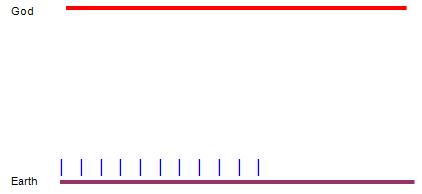
Add two red humans || only.
Connect first two humans with red line down to halfway, then complete red line up from people
Say : ‘This is Adam and Eve. They had a direct relationship with God. But they sinned’
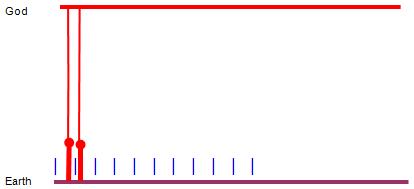
Read Genesis 3v4
4 “You will not surely die,” the serpent said to the woman.
Draw a black line through the middle. Add ‘SIN’, remove red lines up, and change red people to hyave a black centre. Say 'Sin has now entered'
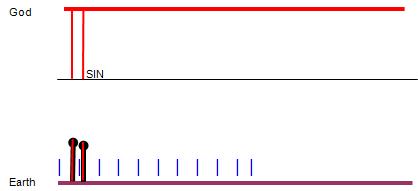
If anything, that was worse than dying – a living death, cut off from God. And now each new person was born in the image of sinful Adam:
Read Genesis 5:1-3
1 This is the written account of Adam’s family line.
When God created mankind, he made them in the likeness of God. 2 He created them male and female and blessed them. And he named them ‘Mankind’ when they were created.
3 When Adam had lived 130 years, he had a son in his own likeness, in his own image; and he named him Seth.
Draw other humans (Red with black middle) with red lines coming down halfway.
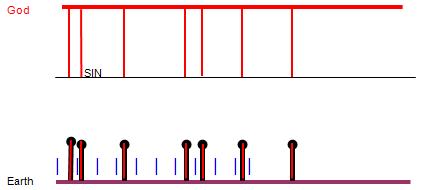
Humankind, having lost contact with God can continue living according to God’s created plan, but only like an animal. A brilliant, creative, intelligent, loving animal, but no more than that; capable of love, but also capable of hate.
If we only live like that, we have no greater purpose than any other animal species: you live, you die: ‘for dust you are and to dust you will return’.
This was not God’s intention for man, so from time to time he reached right down, re-established contact, and used his chosen people to cause others to re-establish contact too.
When God chose people to act on his behalf, some did better than others. But God was flexible, made allowances for their shortcomings, and was even prepared to change his plans to accommodate their failings.
God had planned to take his people from Egypt to Israel by the most direct route. That plan was scuppered so he then led them through the wilderness for 40 years and finally brought them in by the back door. He had intended that Moses would lead them in, but he failed so Joshua had to do it.
God had planned that the Children of Israel would totally drive out the inhabitants of the land (with God’s miraculous intervention) but they failed, and so a poor compromise plan had to suffice.
He planned that they would be his people and he would be their God, and committed himself to a covenant to that effect, but it was turned down by man.
Because of Sin, man had proved that by himself, he would never be able to fulfil God’s purpose in creating him. However much God intervened, man would always spoil God’s plans by his disobedience.
God sent Jesus to take the punishment for sin and remove the barrier it had caused. (Rub out black line SIN), people are again able to come into contact with God. (Make some connections in red
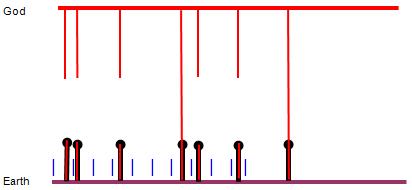
But God’s way of working with us also seems to have changed. In the Old Testament we read of God stepping in and directing whole nations, instructing them how they should behave: (I pictured someone trying to enact war scenes with a table full of disobedient toy soldiers, going off fighting their own battles and refusing to do what they were told).
Now individual people can have access into the mind of God, by the Holy Spirit, through the work of Christ, – and we can begin to know God’s will.
In Hebrews 11:40, talking about the Old Testament Heroes of Faith, we read
40 God had planned something better for us so that only together with us would they be made perfect.
So now it seems that instead of imposing a supreme ‘Master Plan’ on mankind, his plan is to work with individuals to produce a dynamic body of people ‘The Church’.
And it is this new organism, the body of Christ, that fulfils God’s original plan and purpose.
Apart from the Hebrews passage above, there are no references to God’s Plan, or plans, or planning in the New Testament apart from Chapter 1 in Ephesians (which we’ll look at in a moment); rather it talks of God’s will or God’s Purpose.
Nowhere does it suggest that God has an individual plan for our lives.
But surely God has a plan for me? I need to know where I fit in. How do I know that I’m in the right place and doing the right thing, for my life to have the best effect for the Lord’s purposes?
I like to say that ‘The Lord has a plan for my life’. It makes me feel important, and it makes me feel safe. Whatever happens to me must then be part of God’s plan and so it’s OK.
Let’s be rational for a minute. If God has a plan for my life what sort of plan is it? Is it (Display headings)
An all-encompassing plan?
A Flexible Plan?
A very general, high-level plan?
Let’s look at what each of these would involve.
- An all-encompassing plan.
This sort of plan must include absolutely everything I do, or something or someone else has done to me.
As well as the good things in life it must include all the terrible things some people suffer.
It also raises the question of how could God plan the sins I commit and the times when I disobey his plan?
The plan must also include how, when and where I become a Christian.
For many more people, God would have had to plan that they never do become Christians, and are therefore condemned to an eternity in Hell.
- A Flexible Plan.
This sort of plan has millions of permutations covering every possible decision I could possibly make in my life – and actually is no plan at all. It simply says that whatever I do, God must have planned it that way. I don’t find that very satisfactory.
We must make a distinction here between what God knows and what he plans. God is all-knowing. From his perspective in eternity he can and does see the whole of earth’s history from beginning to end. God can see the whole of our life and knows everything that we will do from conception to death.
But that does not mean that he had to plan it. God deliberately created us with minds and wills and expects us to use them!
- A very general, high-level plan?
Ah now we’re talking – but not about a plan, now we’re talking God’s purpose. And we’ll look at that in our next study.








